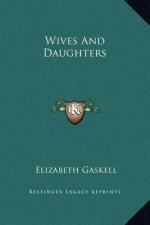at that time regarded Osborne’s fastidiousness
and elegance as another stepping-stone to the high
and prosperous marriage which was to restore the ancient
fortunes of the Hamley family. But now that Osborne
had barely obtained his degree; that all the boastings
of his father had proved vain; that the fastidiousness
had led to unexpected expenses (to attribute the most
innocent cause to Osborne’s debts), the poor
young man’s ways and manners became a subject
of irritation to his father. Osborne was still
occupied with his books and his writings when he was
at home; and this mode of passing the greater part
of the day gave him but few subjects in common with
his father when they did meet at meal-times, or in
the evenings. Perhaps if Osborne had been able
to have more out-of-door amusements it would have
been better; but he was short-sighted, and cared little
for the carefully-observant pursuits of his brother:
he knew but few young men of his own standing in the
county; his hunting even, of which he was passionately
fond, had been curtailed this season, as his father
had disposed of one of the two hunters he had been
hitherto allowed. The whole stable establishment
had been reduced; perhaps because it was the economy
which told most on the enjoyment of both the squire
and Osborne, and which, therefore, the former took
a savage pleasure in enforcing. The old carriage—a
heavy family coach bought in the days of comparative
prosperity—was no longer needed after madam’s
death, and fell to pieces in the cobwebbed seclusion
of the coach-house.’ The best of the two
carriage-horses was taken for a gig, which the squire
now set up; saying many a time to all who might care
to listen to him that it was the first time for generations
that the Hamleys of Hamley had not been able to keep
their own coach. The other carriage-horse was
turned out to grass; being too old for regular work.
Conqueror used to come whinnying up to the park palings
whenever he saw the squire, who had always a piece
of bread, or some sugar, or an apple for the old favourite—and
made many a complaining speech to the dumb animal,
telling him of the change of times since both were
in their prime. It had never been the squire’s
custom to encourage his boys to invite their friends
to the Hall. Perhaps this, too, was owing to
his mauvaise honte, and also to an exaggerated
consciousness of the deficiencies of his establishment
as compared with what he imagined these lads were
accustomed to at home. He explained this once
or twice to Osborne and Roger when they were at Rugby.
’You see, all you public schoolboys have a kind of freemasonry of your own, and outsiders are looked on by you much as I look on rabbits and all that isn’t game. Ay, you may laugh, but it is so; and your friends will throw their eyes askance at me, and never think on my pedigree, which would beat theirs all to shivers, I’ll be bound. No: I’ll have no one here at the Hall who will look down on a Hamley of Hamley, even if he only knows how to make a cross instead of write his name.’




